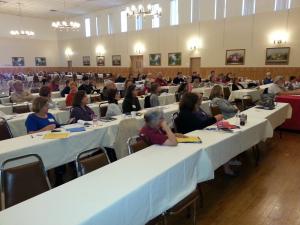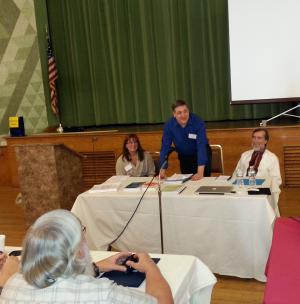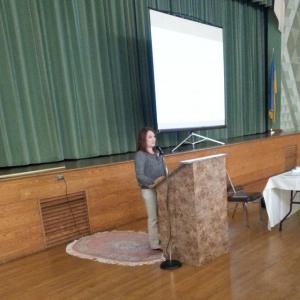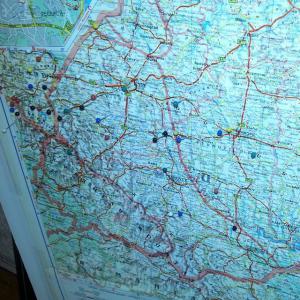The first full-day event of the Center's Family History Group on October 25, 2014 was a great success, with over 70 attendees from throughout the New Jersey, New York, and Pennsylvania area, as well as longer-distance travelers from Maryland, Virginia, and even Utah! The sessions were presented by the noted Eastern European genealogist Matthew Bielawa, molecular genealogist Angie Bush, and our local friends Michael Buryk and Michelle Tucker Chubenko.
Matthew Bielawa, whose research specialization is in Polish and Ukrainian genealogy of Eastern Galicia/Western Ukraine, presented three information-packed sessions giving an introduction to the Austro-Hungarian province of Galicia, a primer on Ukrainian vital records, and a guide to the Central State Historical Archives of Ukraine in L'viv. He provided the historical and sociological context that is essential to doing serious genealogical research in this part of the world, particularly given its changing empires, shifting borders, and diversity of languages and ethnicities. In his Vital Records talk, he introduced the types of Ukrainian birth, marriage, and death records that are available today (some of which go back to the 18th century), where they can be found, the governmental and religious entities that created and retained them, and their structure and how to read them. Finally, he provided an overview of the types of records available at the Central State Historical Archives in L'viv that are relevant to genealogists, and practical hints (based on personal experience) on the procedures, practices, and etiquette of how to best make use of their resources.
Angie Bush, who in addition to her genealogical expertise has a BS in molecular biology and MS in biotechnology, presented an introduction to DNA testing as it relates to genealogical research and family history. She explained the different types of tests that are available, the types of information that each can provide (from the deep past to recent family relationships), and the various commercial vendors that provide DNA testing services and their relative strengths and weaknesses.
The conference ended with a general question-and-answer format segment based mostly on previously-submitted "brick wall ancestors" which conference attendees were having problems getting beyond.
The Center will be presenting more such workshops and conferences in the future, including possible pre-conference training sessions on topics such as Ukrainian and Church Slavonic handwriting and/or cultural heritage activities, such as pysanka writing or cooking. There is clearly an unmet need for information about Ukrainian genealogy, given the large attendance at the conference, and by the many requests from people who were unable attend in person due to geographical distance. The Center and and its Family History Group partners Michael Buryk and Michelle Chubenko will be exploring alternative media by which this much-needed information can be disseminated, including webcasts and Internet chats. Subscribe to the Center's email list to stay up-to-date with the Family History Group's activities.







